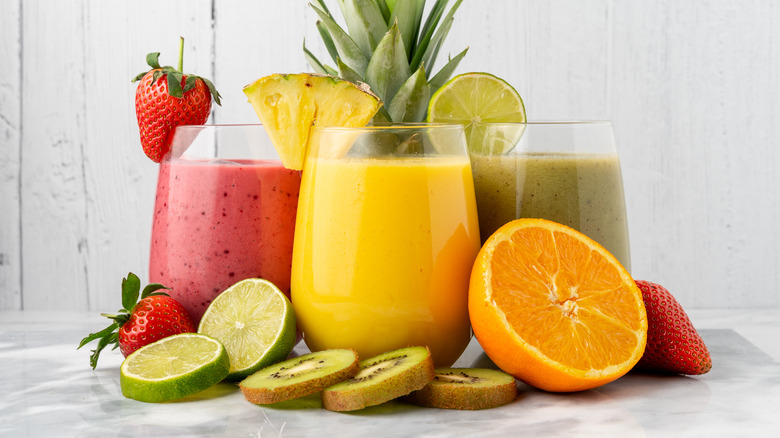Why You Should Check The Label Before Buying Fruit Juice
We all know eating whole fruit is better than drinking fruit juice, but many people find themselves craving a refreshing glass of juice every once in a while. However, not all fruit juices are created equal. Here's what you should know before gulping down a glass.
Before buying juice in the store, you should always check the nutrition label and ingredients. "Juice labels can be very misleading," nutritionist Amy Keating told Consumer Reports. For example, seeing "reduced sugar" on the label may sound like that juice is your best option. However, according to Consumer Reports, this label means that the product "has at least 25% less sugar than the brand's regular product." Since this is a relative number, there could still be a hefty amount of sugar hiding in the drink. Plus, a sugar substitute like an artificial sweetener is often added to make up for the lost sweetness.
You should always buy juice that is labeled as "100% fruit juice" to avoid added sweeteners. You should also avoid juice with the word "diet" on the label. This almost always means that artificial sweeteners have been added to the product, which have been linked to heart disease, type 2 diabetes, and obesity.
Is fruit juice even healthy?
Fruit contains many important vitamins and minerals. As long as you choose 100% fruit juice, most experts agree that the benefits of this product outweigh the concerns. Fruit juice with no additives contains all the health benefits of whole fruit, with the exception of fiber, which is found in the pulp of the fruit (via Verywell Fit). While fruit juice is packed with good-for-you nutrients, the lack of fiber can make it easy to consume more calories than you realize.
Fruit juice can sometimes raise your blood sugar, but this usually only happens when consuming large amounts at once or drinking it when you have diabetes. Some citrus juices can also negatively impact certain medications, so be sure to check with your doctor if you're on any medications that may be affected.
Of course, the healthiest way to enjoy fruit is to eat it whole or blended in a smoothie. Smoothies are a good compromise if you don't like whole fruit because you can still sip on a refreshing drink without losing any nutrients like fiber. When buying smoothies from a restaurant or grocery store, be sure to read the nutrition label and avoid added sugar.


